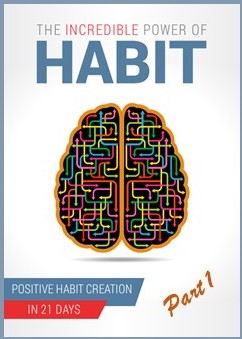Monthly Featured Article (April 2019)
Part Two >
21-Day Habit Creation: The Incredible Power of Habit Forming
Part One
by Susie J. Briscoe
Introduction
 Habits are what help us achieve great things in life. You won’t find a successful person who doesn’t have habits that have helped them accomplish what they needed to on their way to a goal. This 3-part series, 21-Day Habit Creation, can help you develop habits that will take you to your ultimate goal and beyond.
Habits are what help us achieve great things in life. You won’t find a successful person who doesn’t have habits that have helped them accomplish what they needed to on their way to a goal. This 3-part series, 21-Day Habit Creation, can help you develop habits that will take you to your ultimate goal and beyond.
You might look at Olympians’ habits as grueling and so time-consuming – with no guarantee of winning the gold medal – that it seems like too much to bear for just a chance of winning. But, the Olympians have passion for what they’re reaching for. Without passion for the habit you’re trying to create, you’ll have a much more difficult time reaching the finish line.
During the formation of a habit, you’ll probably make all types of excuses why the habit can’t be carried out. For example, if you want to get up early to exercise, your excuses to stay in bed might include:
- “I didn’t get any sleep.”
- “It’s too cold to go outside and run.”
- “I’m sore from yesterday’s workout.”
- “I need to check little Davey’s homework this morning.”
This is the dark side of habit creation. Our subconscious minds are going to try and sabotage the new habit simply because the old habit gives us some type of reward and is easy and familiar.
There are other saboteurs that may try and wreck your efforts of creating new habits. They can be instances from your childhood that have caused you to create habits that don’t serve you well anymore.
Habits such as biting your nails, watching too much television, smoking, and many others can all be traced to something that happened when you were a child. It’s important that you bring those habits to the forefront and learn why you developed the habit; and then make the decision that it no longer fits into your present lifestyle.
Habits come in two distinct types – good and bad. The bad habits are the destructive ones that keep us from living up to our full potential. Unfortunately, they also tend to give us pleasure – that extra sleep in the morning rather than working out or watching our favourite shows on television rather than studying.
Good habits can be created and that’s what this series is all about. It will teach you how habits work, how to formulate a plan of action, and how to make them stick throughout your life.
Some habits need to be repeated for at least 21 days before they become a part of your routine. Some habits take longer – for example, those that are associated with addiction such as smoking.
This 21-Day Habit Creation series will help you understand the key components of a habit – how they work and how you can make them stick.
Part One
How Habits Work
Habits are based on the decisions you make on a daily basis. As you grow older, these decisions become habits that are a part of who you are and what defines you. If you learn to master these decisions and turn them in to positive habits, you’ll be one of those people who are destined to succeed in life.
 There’s no one 'plan of attack' to get rid of bad habits and replace them with positive ones, but there are certain facts we know about how habits work. There are ways to do away with bad habits and create new ones. It may not be easy, but some time and effort on your part will help you succeed.
There’s no one 'plan of attack' to get rid of bad habits and replace them with positive ones, but there are certain facts we know about how habits work. There are ways to do away with bad habits and create new ones. It may not be easy, but some time and effort on your part will help you succeed.
Most time management experts say that a habit pattern can be accomplished within 21 days, but we know that some habits may take longer and some a shorter amount of time. It depends on the complexity of the habit.
For example, some habits may take a small amount of effort and planning, such as setting the alarm clock to wake you up at an earlier hour so that you can eat a healthy breakfast, meditate, or exercise.
Other habits may take more effort and time such as the habits you’ve developed through an addiction. For example, if you’re used to having a cigarette with your morning cup of coffee, it may be difficult to break that habit because of the nicotine addiction factor.
But, habits that are of medium complexity can be changed for the better in about 21 days. Changing a habit involves repetition of the new habit -- and practice, practice, practice.
You may not feel completely comfortable with your new, positive habit for months or years, but the fact that you’re changing yourself for the better will definitely boost your mood and your self-confidence.
Understanding Habits and How They Work
If you want to understand habits, you should first know that any event (such as a complete happiness experience or a painful incident or period of time) can lead you into a habit that may affect you for the remainder of your life.
For example, if you had a near-drowning incident as a child, you may develop a habit of never going near a swimming pool or the ocean. If you’re considered a “neat freak,” you likely developed a habit somewhere in time that makes you love to have everything organized and in its place.
Every habit has a definitive loop. It begins with a trigger or cue that sets off the behaviour and the behaviour reaps a reward. These are the three elements of a habit, and to figure out how to break a bad habit or create a good one involves knowing what your triggers are that lead to the behaviour and the reward you’ll receive.
After you figure out those three elements of the habit you want to break or create, you can create a plan of action. At the end of 21 days of practicing your new habit, you should be well on your way to developing a habit that can become part of your personality and lead you toward success.
Trigger, Behaviours, and Rewards
We’ve all experienced triggers that make us want to act. Smelling Mom’s home-made cake can make it almost impossible to resist a slice. A rainy morning may make you want to stay in bed rather than exercising. A trigger leads to a certain behaviour and the reward is the taste of the cake or a few minutes more of lying in a warm bed.
But, these triggers, behaviours and rewards aren’t going to lead you to success. Anything worthwhile in life requires that you replace some of your bad habits with good ones or create habits that will lead you to the ultimate reward of success.
The behaviours you exhibit when you experience the trigger can be detrimental to ever achieving a goal. You may procrastinate because the task of studying (or whatever) is going to be boring. A “better” behaviour of the moment might be watching television or playing games on the computer.
Rewards are what you experience when you exhibit the behaviour caused by the trigger. Think of it as a carrot on the proverbial stick. When you perform the behaviour that the new habits demand, you get the carrot.
Sometimes the reward you get takes time – such as a degree in the field of study you chose. Sometimes, it’s faster – such as losing weight by sticking to a habit of healthy eating and regular exercise.
The purpose of “21-Day Habit Creation” is to help you understand habit creation, to minimize the time it takes to reach the ultimate reward, and to help you see how creating and implementing good habits in your life will change your life for the better.
Key Habits of Successful People
 There are certain principles of creating habits that successful people know and use to create wealth and personal success. Whether you want more successful relationships, wealth, career, or educational success, you can learn and develop the habits that will spur you on to the success you desire.
There are certain principles of creating habits that successful people know and use to create wealth and personal success. Whether you want more successful relationships, wealth, career, or educational success, you can learn and develop the habits that will spur you on to the success you desire.
Habits can make or break you. If you’re in the habit of procrastinating, you won’t complete projects or goals you’ve set for yourself that will make you successful. You may not even realize what’s holding you back, but a series of bad habits can keep you from success.
Every highly successful person has developed certain positive habits that have led them to monetary or personal success. A highly educated person may have developed a habit of getting up early to study. The new CEO of a company may have early on developed a habit of “early to work and late to leave.”
When you repeat a good habit for at least 21 days, you’re well on your way to creating the habits that will lead you to success and replace the bad habits that have held you back.
Here are a few of the good habits among highly successful people who have learned the secrets of habit creation:
- Have a purpose. Successful people – at some point in their lives – have developed a clear understanding of their purpose in life. This knowledge determines the actions they must take and the habits they must develop to reach the pinnacle of success they envision.
- Negative thoughts are not allowed. Those who have become successful in life have made it a practice to immediately replace negative thoughts with positive ones. Negative thoughts are bound to creep into your minds, but with some practice, you can quickly create a habit of replacing them with positive ones.
- Develop the power of listening. Those people who interrupt others when they’re speaking or think ahead to what they’re going to reply are usually left behind in the journey to success.
- Decision-Making Skills. The big winners in this world can make decisions quickly and strongly. They know that they can always change them later, but it’s important to take the reins of power by making decisions fast and as needed.
- Goal-Setting. This skill of successful people goes along with having a purpose in life, but you’re actually setting goals and putting time limits on accomplishing them. This will help you prioritize the important tasks in life – the ones that will help you succeed.
- Exercise Regularly. Physical exercise can keep both your mind and body in shape so you’re always ready to face the challenges that life hands you. You’ll be able to think more clearly and enjoy good health so that you can function at the top of your game plan. Successful people take time to keep in shape.
- Do What You Love. It’s just impossible to reach a goal if you don’t like what you’re doing. If you’re an accountant but long to be sailing, you’re likely never going to move up in a corporation or in your own business. Take the leap in life to ensure your passion, but be practical about it. If you have a family, it may not be practical to sail around the world, but you could work in the industry.
- Master the Skills You Need to Know. Set your sights on becoming the best in the business. A person who is mediocre in a profession won’t rise to the same heights that a person who builds a foundation of complete knowledge and experience in a profession.
Success can only be reached if you have a goal in place and a plan to ensure you get there. With the proper habits in place, they’ll become so ingrained that they’re automatic in your daily routine.
Main Learning Points of Part One
How Habits Work
You’ve got to understand how habits work if you want to get rid of one you don’t want and create one that will help you rather than hinder you in life. “How Habits Work,” presented the following overview:
- Studies indicate that it takes 21 days to develop a habit pattern.
- Awareness of your actions and lots of practice is the only way to establish a habit pattern that will last.
- Creating a positive habit will boost your mood and provide more self-confidence.
- Past experiences can bring on habits that will affect you for the remainder of your life.
- Every one of your habits is a loop that begins with a trigger, which results in the behaviour, which leads to a reward.
Key Habits of Successful People
When you look carefully at a successful person’s life and how they reached that level, you get the idea that they’re alike in so many ways. They all have developed habits that are key to reaching and maintaining their level of success. It may be physical or mental, but each habit is especially created to obtain goals they’re passionate about.
In "Key Habits of Successful People," you learned about some of the habits that you should develop if you want to be successful in your chosen field or passion:
- Habits are responsible for your success – or lack of success. If you have a bad habit that’s holding you back from something you really want to do, you’ll likely never reach that goal. For example, if you have “climbing Mt. Everest” on your bucket list, you might not ever achieve it if you’re a smoker.
- You may not realize that bad habits are holding you back. Take a hard look at some of the ways you may be your own worst enemy when it comes to habits you’ve developed. For example, if you’re procrastinating about returning to school, you may never learn the skills needed for your chosen profession.
- When you practice a good habit for 21 days, you’re well on your way to a successful outcome. Experts say that it takes approximately 21 days of complete focus and practice for a good habit to “gel.”
- There are certain habits that are likely found in every highly successful person. Such habits as immediately replacing negative thoughts with positive ones, goal-setting, and doing what you love are just a few of the key habits that most successful persons enjoy.
- Practice habits constantly. Habits that are practiced constantly become so ingrained that they will eventually be a natural occurrence in your daily routine.
- Triggers, behaviours, and rewards work together. These three habit-formation elements work together to help you achieve either success or failure. Creating good triggers lead to the behaviours you’ll need that will get you to the ultimate reward.
Don’t forget to share with me what you discovered during this month and let me know if I may share it within this newsletter next month.
